Slavery Eradication & Rights Initiative
We are the only Thai organization in the United States addressing the persistent problem of human trafficking from Thailand into the US.
On the surface, it looks like the workers were legally contracted. But upon closer inspection, it’s slavery. Their passports were confiscated and threats were made if any of them dared to escape. The (US) guest worker program can be legalized slavery if it is not constantly monitored.
Thai CDC started the Slavery Eradication and Rights Initiative, SERI, which means freedom in Thai, to raise awareness about human trafficking and modern-day slavery in the United States. The first case of modern day slavery in the US was discovered after a raid by federal and state authorities, Thai CDC, and law enforcement in El Monte, California in 1995. Seventy two Thai garment workers were found working in conditions of slavery in a clandestine makeshift garment factory where they toiled 16 to 18 hours a day surrounded by barbed-wire and under constant 24/7 surveillance by armed guards for little to no pay for as long as seven years. These workers lived and worked under the fear of physical harm as they were threatened with retaliation and retribution against them and their families in Thailand should they dared escape.
After the case broke, Thai CDC immediately provided for the victims’ daily health and welfare needs. Thai CDC also mobilized other civil, immigrant and workers’ rights organizations to demand justice for the workers ultimately leading to many historic and precedent setting victories for trafficked victims that would forever change how victims are perceived, treated, served and fully restored, spawning an anti-trafficking movement and leading to the enactment of the landmark legislation, Trafficking Victims’ Protection Act (TVPA).
Our Immediate Response Team Provides:
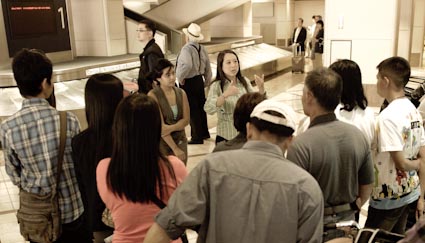
- Food
- Shelter
- Clothing
- Medical Care
- Legal Counsel
The El Monte Thai Garment Slavery Case was just the tip of the iceberg for human trafficking. Since that case, Thai CDC, has worked on six more cases involving over 400 Thai victims trafficked for domestic work, sexual exploitation, welding, and agriculture since 1995. The current Thai CDC case involving over 1,100 Thai farmworkers, 293 of whom are clients of Thai CDC, made international headline news and has been described as the largest case of human trafficking in US history.
As a result of Thai CDC’s vigilance in advocating for victims and exhausting all legal remedies, all victims served by Thai CDC have won redress and restitution, have been able to bring their families to join them in the US (since victims cannot return to their home country due to the real fear and threat of retaliation from their traffickers and recruiters who are sometimes aided by underground gangs and/or corrupt government officials), and been accorded legal status and protection while their traffickers are criminally prosecuted. Thai CDC’s services extend to members of their families too who must then be resettled, provided cultural orientation, and sheparded through a complex web of systems to help them achieve full integration in a new country upon reunification, thereby increasing the number of victims being served by Thai CDC to over 2,000.
Human trafficking has become the most profitable and second largest criminal activity in the world.
Combatting the Problem
Thai CDC’s mobilization of the workers from these cases also led to the movement against human trafficking and slavery in the US, reforms in the garment industry, legislation to protect future trafficked victims, a broader definition of human trafficking to include all forms of slavery like practices such as contract and debt bondage labor, the founding of the Coalition to Abolish Slavery and Trafficking, education and training of law enforcement and service providers, and greater awareness of the serious problem which, sadly, continues to persist today unabated.
To learn more about this topic, watch the videos of our anti-trafficking symposium at thaicdc.org/symposium.
Survivor Support
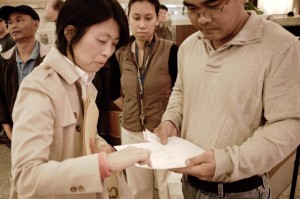 The relief, education, counseling and advocacy that Thai CDC provides to each victim requires extensive and comprehensive case management. While we help them overcome their trauma, we develop their survival and self-sufficiency skills and prepare them to seek legal redress. As a result of our campaign for restitution on behalf of the victims, we are instrumental in transforming victims into agents for social change and in influencing legislation to provide adequate protections for victims of trafficking.
The relief, education, counseling and advocacy that Thai CDC provides to each victim requires extensive and comprehensive case management. While we help them overcome their trauma, we develop their survival and self-sufficiency skills and prepare them to seek legal redress. As a result of our campaign for restitution on behalf of the victims, we are instrumental in transforming victims into agents for social change and in influencing legislation to provide adequate protections for victims of trafficking.
Once certified by the federal government as trafficked victims, victims receive the benefit of legal status and public assistance. This certification process is a very lengthy, onerous and time consuming legal process. Due to the real fear of retaliation back in their home country, their families are also reunited with them in the United States. Once the family is reunited, they must be resettled requiring additional case management (e.g. obtaining social security cards, proper forms of identification, public benefits, housing, furnishings, personal supplies, etc…). Prior to the family member’s arrival to the US, we work with the Office of International Migration to secure their proper traveling documents and visas, airfare, and provide them with cultural orientation. We also want to ensure that survivors of slavery and trafficking will not endure a second captivity of poverty by helping them become economically self sufficient through our economic development programs. However, the multifaceted and overwhelming needs of survivors of trafficking will always outpace our current resources.
How to help

We rely on a large number of volunteers to assist us. Our ultimate goal is to make survivors of human trafficking whole persons again with the will and self-determination to pursue justice and to lead an independent and productive life.
Contact Panida Rzonca at (323) 468-2555 or by email at Panida@thaicdc.org.
“It is the work on behalf of trafficked victims that is most inspiring and remarkable as we witness the incredible transformation of victims from helpless individuals to a powerful force for social change.” – Chancee Martorell, Thai CDC Executive Director
Our History of Fighting for Freedom
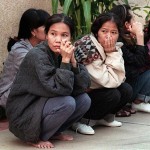 1995 El Monte Thai Garment Slavery Case. First modern day slavery case in US history: 72 Thai garment workers were liberated from a slave shop in El Monte, CA.
1995 El Monte Thai Garment Slavery Case. First modern day slavery case in US history: 72 Thai garment workers were liberated from a slave shop in El Monte, CA.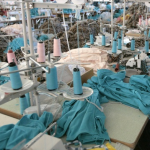 1996 Thai Garment Workers’ Case. Came to the aid of another group of enslaved Thai garment workers.
1996 Thai Garment Workers’ Case. Came to the aid of another group of enslaved Thai garment workers.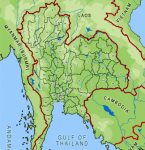 1997 Thai Sexual Slavery Case. Came to the aid of Thai women trafficked for sexual slavery.
1997 Thai Sexual Slavery Case. Came to the aid of Thai women trafficked for sexual slavery.-
 1998 Thai Domestic Workers’ Case. Redress for Thai domestic worker escapees.
1998 Thai Domestic Workers’ Case. Redress for Thai domestic worker escapees.
 2001 Thai Welders’ Case. First male human trafficking case in US history. Helped Thai welders reach a $1.4 million settlement against Trans Bay Steel Corporation for civil rights violations.
2001 Thai Welders’ Case. First male human trafficking case in US history. Helped Thai welders reach a $1.4 million settlement against Trans Bay Steel Corporation for civil rights violations.
 2003 Ongoing Thai Farmworkers’ Case. Largest human trafficking case in US history. Continuing to pursue redress and restitution for over 1,000 H2A guest workers.
2003 Ongoing Thai Farmworkers’ Case. Largest human trafficking case in US history. Continuing to pursue redress and restitution for over 1,000 H2A guest workers.
“If slavery is not wrong, nothing is wrong.” – Abraham Lincoln
Media
Slavery in America
[embedplusvideo height=”210″ width=”375″ standard=”http://www.youtube.com/v/V0e_6EAlUxw?fs=1″ vars=”ytid=V0e_6EAlUxw&width=375&height=210&start=&stop=&rs=w&hd=0&autoplay=0&react=1&chapters=¬es=” id=”ep4868″ /]
Food Chain Slaves
[embedplusvideo height=”210″ width=”375″ standard=”http://www.youtube.com/v/IbAr368CKGg?fs=1&hd=1″ vars=”ytid=IbAr368CKGg&width=375&height=210&start=&stop=&rs=w&hd=1&autoplay=0&react=0&chapters=&notes=” id=”ep3128″ /]
- Los Angeles Times: Thai Workers Describe being Lured into Slavery in U.S., Sep. 10, 2010 (Thai Farmworkers’ Case)
- Los Angeles Times: Thai Human Trafficking Victims Reunite with Families (Thai Farmworkers’ Case)
- CNN: Thai Man Says He Was a Modern-Day Slave, Sep. 8, 2010 (Thai Farmworkers’ Case)
- Mother Jones: Bound for America, May+June 2010 (Thai Farmworkers’ Case)
- Los Angeles Times: Program to Fight Human Trafficking is Underused, Dec. 19, 2005 (Thai Domestic Workers’ Case)
- Los Angeles Times: From Virtual Slavery to Being Boss, Oct. 25, 2001 (El Monte Thai Slavery Case)
-
U.S. Secretary Hilary Clinton’s Op-Ed: An End to Human Trafficking, Nov. 09, 2010 (Thai Farmworkers’ Case)
-
Los Angeles Times: Thai Workers Describe being Lured into Slavery in U.S., Sep. 10, 2010 (Thai Farmworkers’ Case)
-
CNN: Thai Man Says He Was a Modern-Day Slave, Sep. 8, 2010 (Thai Farmworkers’ Case)
-
Hawaii News Now: Man Accused of Human Trafficking Allowed Bail, Sep. 8, 2010 (Thai Farmworkers’ Case)
-
NY Times Editorial: Forced Labor, Sep. 7, 2010 (Thai Farmworkers’ Case)
-
Los Angeles Times: Federal Grand Jury Indicts Associates of Beverly Hills Firm in Human-Trafficking Case Sep. 4, 2010 (Thai Farmworkers’ Case)
-
New York Times: Indictment Accuses Firm of Exploiting Thai Workers, Sep. 4, 2010 (Thai Farmworkers’ Case)
-
KABC: Eye Witness News, Sep. 3, 2010 (Thai Farmworkers’ Case)
-
CNN: 6 Charged in Human Trafficking Scheme Involving Thai Workers, Sep. 3, 2010 (Thai Farmworkers’ Case)
-
KPFK Democracy Now: 4 Accused of Coercing 400 Thai Workers into Forced Labor, Sep. 3, 2010 (Thai Farmworkers’ Case)
-
USA TODAY: Six Indicted for Alleged Human Trafficking of Thai Workers to USA, Sep. 3, 2010 (Thai Farmworkers’ Case)
-
KITV Honululu: Hawaii Home To Largest Human Trafficking Case in US History, Sep. 3, 2010 (Thai Farmworkers’ Case)
-
Pasadena Star News: Martorell: Human Trafficking Requires a Global Response, Aug. 06, 2010
-
Pasadena Star News: Once-Enslaved Garment Workers Continue Fight, Aug. 2, 2010 (15th Anniversary of the El Monte Case)
-
San Gabriel Valley Tribune: Play Brings Back Horror of El Monte Sweatshop and Slavery Case, July 17, 2010 (Fabric, El Monte Case)
-
Los Angeles Times: Theater Review: “Fabric” at Company of Angels, July 15, 2010 (Fabric, El Monte Case)
-
LA Daily News: Survivors of slavery ‘still fighting’, Feb. 11, 2010
-
The Federal Anti-Human Trafficking Program Highlights Thai CDC for Our Efforts in Combating Human Trafficking, Oct, 2009
-
Los Angeles Times: Human Trafficking Case Ends for 48 Thai Welders, Dec. 8, 2006 (Thai Welders’ Case)
-
Los Angeles Times: Program to Fight Human Trafficking is Underused, Dec. 19, 2005 (Thai Domestic Workers’ Case)
-
Los Angeles Times: From Virtual Slavery to Being Boss, Oct. 25, 2001 (El Monte Slavery Case)
-
PBS: Slavery in America, March 8, 2001 (Thai Domestic Workers’ Case)
-
Los Angeles Times: Speaking Up for the Silent, Aug. 23, 1995 (El Monte Slavery Case)
